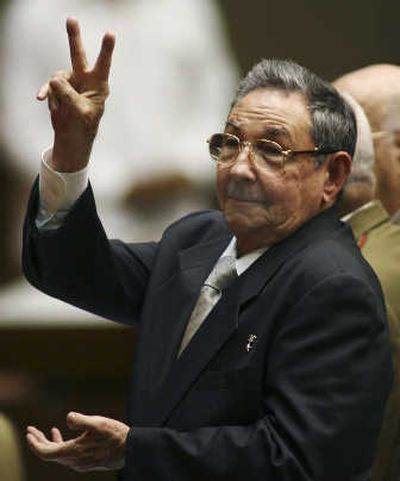Raul Castro named as Cuba’s leader

MIAMI – Cuba’s parliament signaled Sunday that the status quo of a stunted state-run economy and strained relations with the United States will persist for now as it named Raul Castro to replace his ailing brother Fidel as president and chose another aging revolutionary as the nation’s No. 2 leader.
The selection of Raul Castro, 76, to head the Council of State had been widely predicted, as he stood loyally by his brother’s side throughout a 49-year rule. But the appointment of Jose Ramon Machado, 77, as first vice president surprised Cuba analysts who had expected that a younger candidate would be named to bring change to the country’s ossified power structure.
Raul Castro’s first action as president was to propose, with unanimous endorsement of the parliament, that the 81-year-old Fidel retain an influential role in guiding the country.
The new president said he would consult his elder brother on issues of “special transcendence for the future of the nation, especially those having to do with national defense, foreign policy and economic development.”
“I assume this responsibility knowing that as far as the commander in chief is concerned, there is only one. Fidel is Fidel,” Raul Castro told the newly sworn assembly. “All of us know he is irreplaceable.”
The appointment of staunch communists offered slim prospects for improved relations with Washington, D.C., where officials through 10 presidencies have insisted that Cuba improve its record on human rights before any mending of political ties can occur.
U.S. Secretary of State Condoleezza Rice called the leadership change a “significant moment” but urged Cubans to undertake “an open and comprehensive dialogue about their country’s future, free of fear and repression.”
“We urge the Cuban government to begin a process of peaceful, democratic change by releasing all political prisoners, respecting human rights, and creating a clear pathway toward free and fair elections,” Rice said in a statement.
Cubans’ attitudes toward the leadership choices were muted.
In Miami, Cuban exiles viewed the news as confirmation that little will change in their homeland until both Castro brothers are dead.
“We’ve traded one dictator for another, one murderer for another, and the people of Cuba still won’t know what it’s like to be free,” said Ismael Jamide, 55, who left Cuba in 1992. “This gang of delinquents will not make economic change – are you kidding? They know that if they do, the power will slip from their hands.”
Some predicted life in Cuba would worsen under Raul Castro, noting that he lacks the intellect and magnetism of his brother.
“It’s the same dog with a different collar,” said Yolanda Salvador, 67, who has been in the United States 37 years. “Fidel may be decrepit physically, but until his last breath he will make all the decisions in Cuba.”
In Havana, Cuba’s most respected dissident, Oswaldo Paya, called the election “tragicomic” and insisted the changes “were not the choice of the people.”